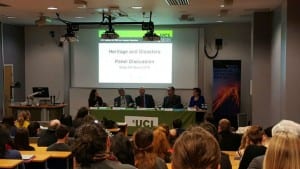Reflecting on the IRDR Panel Discussion: Heritage and Disasters
By ucyow3c, on 23 March 2016
![]() Written by Dr Farnaz Arefian, Enterprise Manager, UCL Institute for Risk and Disasters Reduction
Written by Dr Farnaz Arefian, Enterprise Manager, UCL Institute for Risk and Disasters Reduction
The UCL Institute for Risk and Disasters Reduction (IRDR) successfully held its public panel discussion on Heritage and Disasters at UCL on 9 March, discussing cultural heritage protections and how to plan for and recover from disasters.
The attendees enjoyed an interactive and thought-provoking discussion with the panelists and a drinks reception, during which attendees could network and continue their informal discussions followed the discussion.
Five panelists from academia and practice engaged in a vibrant and lively discussion on how to protect cultural heritage from disasters such as earthquakes and conflicts and it was exciting to see attendees from across the heritage sector, including museums, heritage studies and NGOs, as well as attendees from practice.
The panel included William Brown, National Security Adviser, Arts Council England; Dr Sergio Olivero, Head of Energy and Security Research Area at the Istituto Superiore sui Sistemi Territoriali per l’Innovazione (SiTI), Italy; Dr Kalliopi Fouseki, lecturer and course director for the MSc Sustainable Heritage at the UCL Institute for Sustainable Heritage (ISH); Jonathan N. Tubb, Keeper (Head), Middle East, the British Museum.
Dr Farnaz Arefian, Enterprise Manager at IRDR and Founder of ‘Silk Cities’ Platform, chaired the panel, opening the discussion by focusing on key cultural heritage preservation questions: Why the protection of cultural heritage is important and how we can protect and enhance its resilience to disasters? What are the complexities in practice? How existing academic discourse and research on heritage and disaster risk reduction can play role in heritage resilience? How the public and private sectors can be mobilized to proactively reduce disaster risk to our cultural heritage and enhance successful recovery and/or reconstruction when it is impacted? (more…)
 Close
Close



